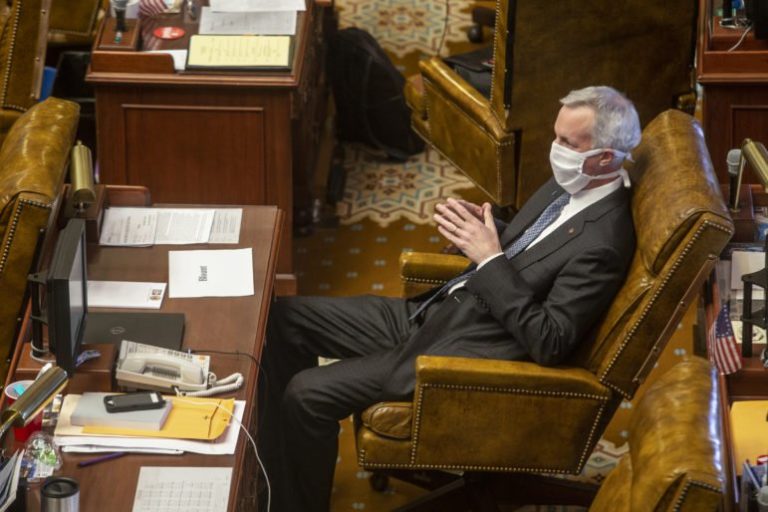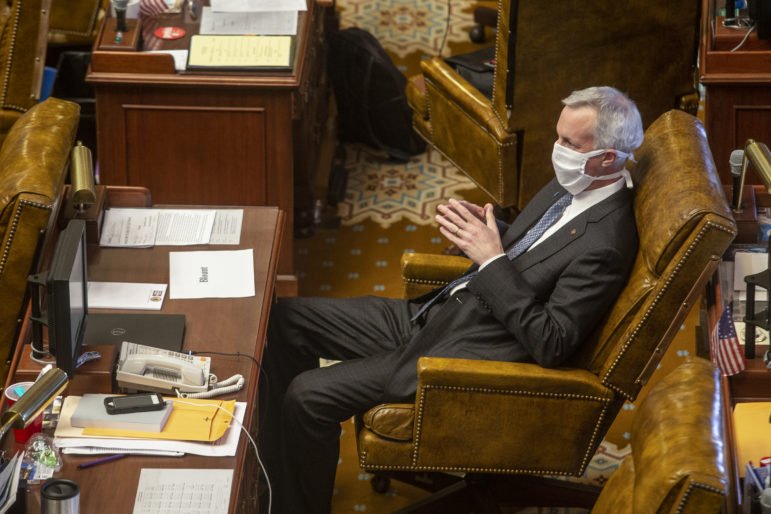

Eric J. Shelton/Mississippi Today
Sen. David Blount listens to Lt. Gov. Delbert Hosemann during legislative session at the Capitol in May.
Mississippi will continue to be the only state in the nation to require both the absentee ballot and the request of the absentee ballot to be notarized under compromise legislation that is expected to be voted on in the coming days.
Legislators have been working on proposals they say are designed to make it safer and easier to vote this November in light of COVID-19 concerns. But in the compromise proposal hammered out between House and Senate leaders, Mississippians would still be required to get both documents notarized when voting absentee.
“We have the most restrictive, onerous, difficult vote-by-mail laws in the nation,” said Sen. David Blount of Jackson, the only Democrat assigned by leaders to work on the compromise legislation and not pleased with the final outcome. “We needed to change the laws before the coronavirus. We certainly need to change them now.”
Republicans have been reluctant to ease the state’s absentee voting laws because they say they are concerned about fraud occurring in the mail-in voting process.
Most states have changed their early voting laws for upcoming elections to make it easier to vote if the coronavirus is an issue in November.
House Elections Chair Jim Beckett, R-Bruce, said the final compromise hammered out, and most likely to be voted on by the full Legislature in the coming days, will put in place safeguards. In addition legislators are looking to provide more funds to local governments for elections.
The House on Friday passed a bill to spend $16.5 million in federal CARES Act money in an effort to make Mississippi elections safer during the coronavirus pandemic.
The bulk of the spending, about $15 million, would go to purchase optical ballot scanner machines.
“These machines are for the purpose of reducing our human contact during elections,” said Beckett, author of House Bill 1789. “Some counties already have this equipment.” But he said about 68 of the state’s 82 counties do not have the scanners.
The “optical mark reading” machines would be easier to clean and sanitize than the “direct recording electronic” machines many counties use.
Other spending in the bill would go to hire more than 2,000 additional poll workers, at $125 a day, to help at polling precincts with cleaning, promoting social distancing and other duties.
The measure would also provide $665,000 to county circuit clerks to hire additional deputy clerks temporarily to help with an expected increase in absentee voting and other work.
About $20,500 would go to pay election commissioners an extra $50 for Election Day “for pandemic pay due to the increased risk of exposure to COVID-19.”
Rep. Omeria Scott, D-Laurel, questioned whether the bill would provide enough money for counties to open more precincts and hire enough people to make elections safe amid the pandemic.
Beckett said the bill was drafted after consultation with the secretary of state’s office – which had in turn consulted county leaders. He said the secretary of state has also received more than $4 million in federal money to help with election costs and that other legislation would allow counties to hire more election workers with local tax dollars.
Other election changes that are likely to be voted on in the coming days would give people who do vote by mail more time to get their ballots returned to the local circuit clerk’s office. The proposal also would allow people who are ill because of COVID-19 or in quarantine to vote by mail or in person.
In addition, Secretary of State Michael Watson, whose office oversees elections, said earlier he believes existing law would allow the circuit clerks to let people vote early if they had coronavirus concerns, such as a pre-existing condition. Many Democrats, though, said that would not be enough of an allowance since the early voting exception could be interpreted differently from county to county.
“The state of Mississippi is making no provisions for voting during the coronavirus pandemic,” Blount said. “That is a mistake. That puts Mississippians at risk.”
Unlike Mississippi, a vast majority of states already allow no excuse early voting.
The post State mail-in voting remains ‘most restrictive’ under legislative proposal, senator says appeared first on Mississippi Today.